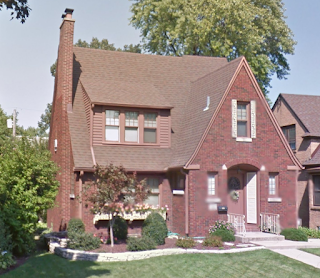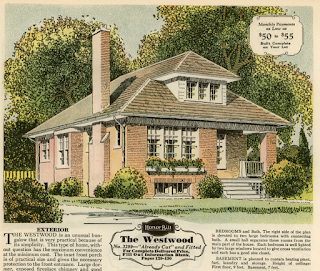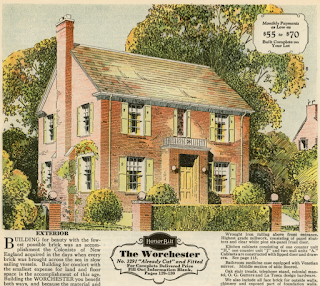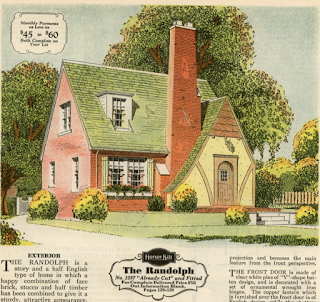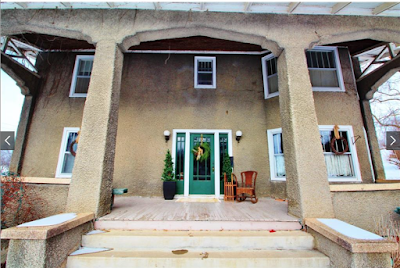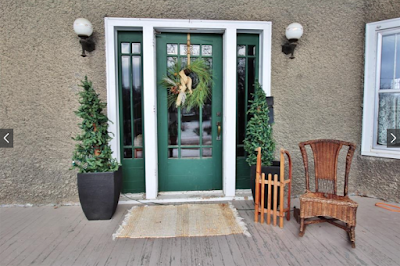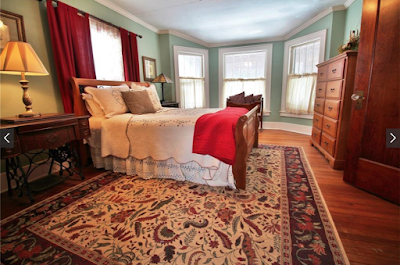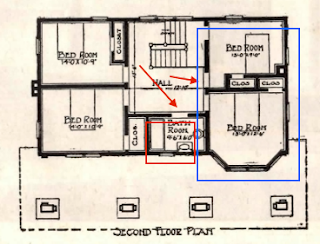 |
| 45 172nd Place, Hammond, Indiana • Authenticated Sears Belmont • circa 1932 |
Around 1930, Sears started really marketing their brick-face models. Many were brick-face versions of established models, such as the Lynnhaven's brick-face counterpart, the Belmont. The Lynnhaven was introduced in 1930, and the Belmont, in 1931 or 32.
 |
| Here is the Belmont as it appears in my September, 1931 catalog. We think of this as a 1932 catalog, however. |
This Belmont in Hammond, Indiana, was authenticated by a mortgage release record I found listed in a 1937 issue of a Hammond newspaper. Using Ancestry.com, I was able to track down Edward A. Eidem to this address, thanks to a 1935 City Directory for Hammond:
 |
| From the 1935 City Directory for Hammond, Indiana |
I don't have a record of when the mortgage was taken out, and the house built (nor is it listed in the tax records) but I would hazard a guess that it was 1932. It is more likely that the mortgage was a 5 year loan, than, say, a 6-year, or a 4 year. Also, Mr. Eidem and Miss Ann Krall were married in 1931, so it seems likely that the house might have been built by them sometime after their marriage. I know about their marriage date, because I ran across this cute snippet in the newspaper, describing a lovely little shower given in honor of Miss Krall, just before her wedding:
 |
| This appeared on Friday, February 13, 1931, so that means that they were married on Valentine's Day! |
Besides being in brick face, the Belmont differs from the Lynnhaven by having the reversed floor plan. But, to me, this barely even warrants mentioning, because anyone ordering either model -- the Lynnhaven or the Belmont -- could order it with the floor plan reversed from what it was in the catalog.
 |
| Sears Lynnhaven, in the 1930 catalog. |
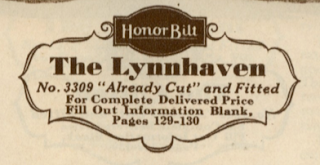 |
| The Lynnhaven and the Belmont came "Already Cut" & fitted. |
 |
| Notice the side entrance, and the stairway, on the right. |
 |
| Two very nice size bedrooms, and a third, smaller one. |
Sears sometimes used the same name for different models, if they had discontinued the first model far enough ago in the past. Such is the case with the Belmont. According to this blog post at Sears Modern Home Junkie, written by Dale Haynes, the earlier Belmont model was offered from 1914 to 1921.
 |
| Here is the first Belmont that Sears offered, as advertised in my 1920 catalog. |
Other Brick-Face Models
Here are some of the other brick-face versions of non-brick models, offered beginning around 1930:
Non-brick version: The Collingwood
You can see a Westwood in Highland Park, Illinois, in this blog post of Sears Homes of Chicagoland, by Lara Solonickne.
Non-brick version: The Sheffield
Non-brick version: The Newark
You can read further about this model, and see an example of a Worchester in East Lansing, Michigan, here in this blog post by Andrew Mutch, at Kit House Hunters
Non-brick version: The Lewiston
See a Colchester in this blog post by Lara Solonickne, at Sears Homes of Chicagoland.
Non-brick version: The Willard
Click here to see a Randolph in Webster Groves, Missouri (St. Louis area).
Non-brick version: The Dover
Click here to see a Sears Mansfield in Palatine, Illinois, presented on Lara Solonickne's blog, Sears Homes of Chicagoland.
Non-brick version: The Barrington
Click here to see a Cambridge in Eastchester, New York, on the blog Kit House Hunters, by Andrew Mutch.
Non-brick version: The Claremont
Non-brick version: The Mitchell
Click here to see a Sears Homes of Chicagoland blog post about a Stratford in Mount Prospect, Illinois.
Click here to see a Galewood in Chicago, presented by Lara Solonickne, at Sears Homes of Chicagoland.
Other Models In Brick
Other Sears models were available in brick veneer, but did not have a name change for that version. For example: - See a brick-veneer Maplewood in this earlier blog post of mine
- See a brick-veneer Americus, in this earlier blog post of mine
- See a brick-veneer Brookwood, in this earlier blog post of mine
- See a brick-veneer Alhambra, as shown in a photograph in the 1931 Sears Modern Homes catalog, in this blog post of Kit House Hunters, by Andrew Mutch.
Remember: Sears pre-cut kit homes were never made in solid brick... only with the offer of brick veneer for the finish layer. That means that the brick did not serve a support role in the structure of the building, as it does when there are two or three layers of full-size brick (common in much older brick homes in many U.S. cities, I would say, pre-1920s), instead of a wooden frame structure . The homes shown here are all brick-veneer, using "face brick" as the outer veneer. Stay tuned for an upcoming post, however, on all-brick, non-kit homes built by Sears.
 |
| This is the second page of the 1930 catalog -- they were sure ready to start selling brick-face homes! |
